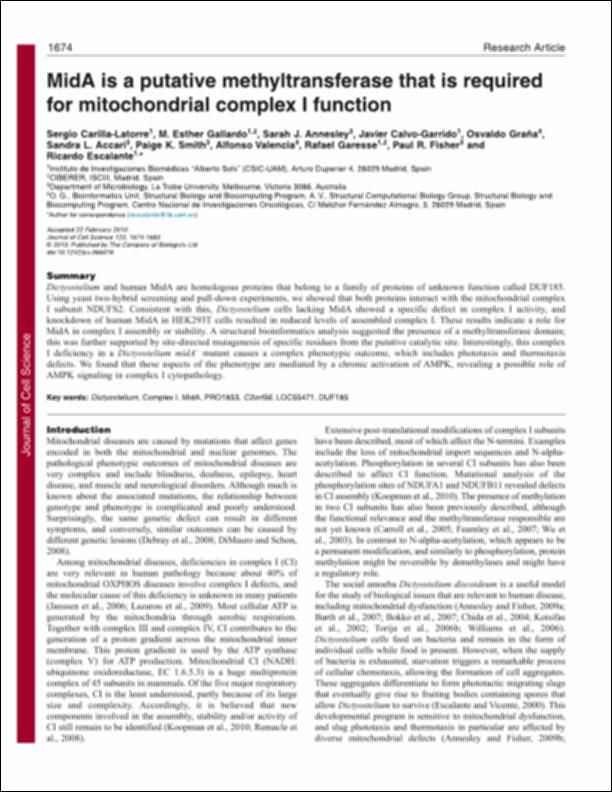Por favor, use este identificador para citar o enlazar este ítem:
http://hdl.handle.net/10637/15253MidA is a putative methyltransferase that is required for mitochondrial complex I function
| Título : | MidA is a putative methyltransferase that is required for mitochondrial complex I function |
| Autor : | Carilla-Latorre, Sergio Gallardo, M. Esther Annesley, Sarah J. Calvo Garrido, Javier Graña, Osvaldo Accari, Sandra L. Smith, Paige K. Valencia, Alfonso Garesse, Rafael Fisher, Paul R. Escalante, Ricardo |
| Materias: | Dictyostelium; Complex I; MidA; PRO1853; C2orf56; LOC55471; DUF185 |
| Editorial : | The Company of Biologists |
| Citación : | Carilla-Latorre S, Gallardo ME, Annesley SJ, Calvo-Garrido J, Graña O, Accari SL, Smith PK, Valencia A, Garesse R, Fisher PR, Escalante R. MidA is a putative methyltransferase that is required for mitochondrial complex I function. J Cell Sci. 2010 May 15;123(Pt 10):1674-83. doi: 10.1242/jcs.066076. Epub 2010 Apr 20. PMID: 20406883 |
| Resumen : | Dictyostelium and human MidA are homologous proteins that belong to a family of proteins of unknown function called DUF185. Using yeast two-hybrid screening and pull-down experiments, we showed that both proteins interact with the mitochondrial complex I subunit NDUFS2. Consistent with this, Dictyostelium cells lacking MidA showed a specific defect in complex I activity, and knockdown of human MidA in HEK293T cells resulted in reduced levels of assembled complex I. These results indicate a role for MidA in complex I assembly or stability. A structural bioinformatics analysis suggested the presence of a methyltransferase domain; this was further supported by site-directed mutagenesis of specific residues from the putative catalytic site. Interestingly, this complex I deficiency in a Dictyostelium midA− mutant causes a complex phenotypic outcome, which includes phototaxis and thermotaxis defects. We found that these aspects of the phenotype are mediated by a chronic activation of AMPK, revealing a possible role of AMPK signaling in complex I cytopathology |
| URI : | http://hdl.handle.net/10637/15253 |
| Derechos: | http://creativecommons.org/licenses/by-nc-nd/4.0/deed.es |
| ISSN : | 1477-9137 |
| Fecha de publicación : | 15-may-2010 |
| Centro : | Universidad San Pablo-CEU |
| Aparece en las colecciones: | Medicina |
Los ítems de DSpace están protegidos por copyright, con todos los derechos reservados, a menos que se indique lo contrario.


